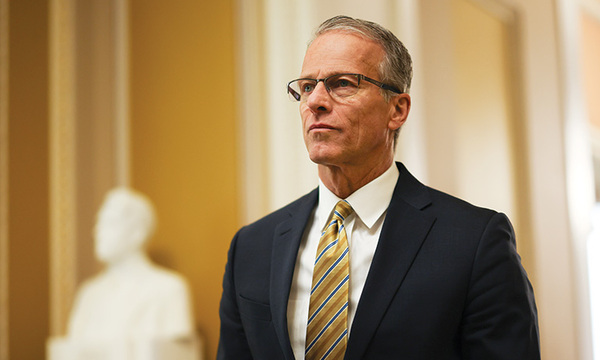
In his new book, Ordinary: Sustainable Faith in a Radical, Restless World, alumnus Michael Horton (’87) argues that evangelicals should tone down their “radical” rhetoric and superlative calls for “extreme” and “world-changing” faith. This “restless” faith is neither sustainable nor is it truly transformative, argues Horton, who teaches systematic theology and apologetics at Westminster Seminary California. The most radical call for the Christian, rather, is to live the day-to-day “ordinary” life of faithful worship and service in
 a local congregation over the long haul. In this interview, ČŐČŐĹöşÝşÝÔęľĂľĂÔę2023 Magazine asked Horton — who hosts the weekly White Horse Inn broadcast and serves as editor-in-chief of Modern Reformation magazine — about his book and what it looks like to live an unglamourous but truly transformative faith.
ČŐČŐĹöşÝşÝÔęľĂľĂÔę2023 Magazine: For college students today, do you feel like there is an unhealthy pressure to “change the world” or achieve “great things”? What advice would you give to them, particularly Christian college students, regarding living an “ordinary” life that is also meaningful?
Michael Horton: It’s no secret that the “Boomer” generation has been in love with superlatives. Everything has to be extraordinary, stellar, “out of the park.” Yes, I think we’re raising stressed-out kids and that the culture in our churches often fosters that. Every high school and college graduation speech is “Change your world!” And that’s the message they also keep hearing in youth groups and college ministries that tend to draw young people away from other generations. Stewing in their own juices, they’re surrounded by peers who are also at that “make a difference, leave your mark” stage of life.
What are the biggest dangers in framing the Christian life in extreme and “radical” terms?

If every concert or football game is “epic,” the everyday loses its own charm. We become unable to live in the moment, taking advantage of ordinary — even boring — moments to invest in the people and callings that are most important. To be honest, I can go to India or Africa and it’s a rush: “I’m making a difference, even this far away from home!” It’s being there every day for my wife and kids — or my aging mom — that’s tough. In any field, becoming a disciple takes time. It’s the little things that add up over a long period of time to real transformation. After getting caught up in the latest spiritual fad a few times, it’s easy to become cynical and burned-out on the whole thing. Plus, it makes everything about us. We’re making our “life movie” and everyone else — including God — has a supporting role in it. Being obsessed with our “radicality” can take our eyes off of Christ, “the author and finisher of our faith.”
What do you think led to the “radical” movement, and is there some merit to being cautious of a “too-ordinary” Christianity?

The history of revivalism in America has left an indelible stamp. Sure, you go to church and hear sermons. You’re baptized and take communion. You pray, read your Bible and share your faith with others. You have good relationships with your neighbors. But the revivalist came to town and all bets are off. It’s not the ordinary means of grace in Christ’s visible body that matter. Break loose and experience the radical event or movement! Are you tired of boring “churchianity”? And, of course, we’re bored by daily discipleship and the means of grace that Christ has appointed for our pilgrim journey. But whether it’s sports or the arts or anything else important to us, we invest in these sometimes dull routines because we value the object of our quest.
But you’re exactly right: There is a danger on the other side. Precisely because we’re OK with the ordinary, we can truly revel in the extraordinary moments of insight, experience and opportunities to serve. In fact, it’s because of the investments in the ordinary that we’re ready to tackle the more adrenaline-rush opportunities.
In the book you say that the call to “ordinary” does not mean settling for mediocrity and it does not mean Christians should stop striving for excellence. When is an active, aspirational, excellence-seeking faith a good thing and when does it go wrong?
We shouldn’t misunderstand the call to “ordinary” as a call to mediocrity. As I argue in the book, it’s actually our perpetual distraction by “the next big thing” that keeps us from planting our roots deeply and just growing and blooming. It’s contentment with the ordinary that actually encourages excellence over the long haul. Rosa Parks didn’t wake up one day and say, “I’m bored. I think I want to do something big — I want to become the First Lady of the Civil Rights Movement.” She was formed by countless investments of ordinary people in ordinary ways over decades into the kind of person who would, on an ordinary ride to work, simply refuse on a certain day to sit at the back of the bus. The world is filled with people longing to be stars and they lack the character to be even good supporting actors.
In chapter 7 you write, “The cure for selfish ambition and restless devotion to The Next Big Thing is contentment.” What does the shape of contentment look like in the Christian life, and what advice would you give Christians for becoming more content?

The Apostle Paul said he had learned to be content when things are going well and not so well, in plenty and in lack. Why? Because Christ was his treasure (Phil. 4:11–13). We don’t have anything to prove to God. “He demonstrated his love for us, in that while we were still sinners, Christ died for us” (Rom. 5:8). Christ is our righteousness (1 Cor. 1:30). As Luther said, “God doesn’t need your good works; your neighbor does.” So now my neighbor is a gift, not a means to an end for my own spiritual advancement. I don’t need The Next Big Thing, because each Lord’s Day Christ delivers himself, along with all of his benefits, to me by his Spirit through his Word and sacraments. Who could ask for anything more than being “seated with him in heavenly places in Christ Jesus” (Eph. 2:6)? This outlook doesn’t inhibit service, but fuels it — it frees us to look up in faith to Christ and out to our neighbors in love.
In your chapter on “super-apostles” and our tendency to organize our faith around celebrity pastors and charismatic leaders, you say, “We desperately need more Timothys and a lot fewer would-be Pauls in the church.” Could you expand on this a bit? What is the difference between, as you say, the “extraordinary ministry” of the apostles and the “ordinary ministry” of those who followed them? Is there no place for extraordinary ministry today?
I argue there that the New Testament itself suggests a qualitative transition from the apostles to the ordinary ministers. Called immediately and directly by Jesus Christ in person, the apostles were Christ’s ambassadors in a unique way. Through them, God gave us the New Testament. We’re not laying the foundation again, but building on it. We come along and add a few stones here and there, but we come and go. Christ is the one building his church. Today, though, there’s an emphasis on so-and-so’s church. You hear pastors sometimes referring to “my ministry.” There’s too much talk about legacies, succession plans, and top-down “Moses” models of ministry. We don’t need any more apostles; the foundation has been laid. What we need are faithful pastors who take what the apostles delivered and pass it on.

In what ways can local churches help fix the problem of an implicit hierarchy of calling, wherein faithful members in “ordinary vocations” (accountants, engineers, stay-at-home parents, etc.) feel a bit like second-class Christians compared to the “world-changer” pastors and missionaries in the congregation?
Jesus compares us to “salt.” A week in this culture of ours can desalinate us! We need to be re-salinized each week by the Word. Pastors are just waiters at God’s feast, serving Christ’s people with the foretaste of the heavenly banquet. They preach, baptize, instruct, rebuke and comfort. They come to hospital bedsides and spend hours to prepare edifying sermons. It’s a crucial job in the kingdom. And yet, it’s the members who are shaken out into the world as salt and light in their various callings. That’s where our good works go. The Word creates faith and faith creates the love that bears the fruit of good works. A mom and dad changing diapers are loving and serving their nearest neighbor as much as a pastor or missionary. Whether making shoes or laws, exploring the stars or driving a truck, everyone is given a calling by God to pass out his gifts to others each day.
 ČŐČŐĹöşÝşÝÔęľĂľĂÔę2023
ČŐČŐĹöşÝşÝÔęľĂľĂÔę2023


